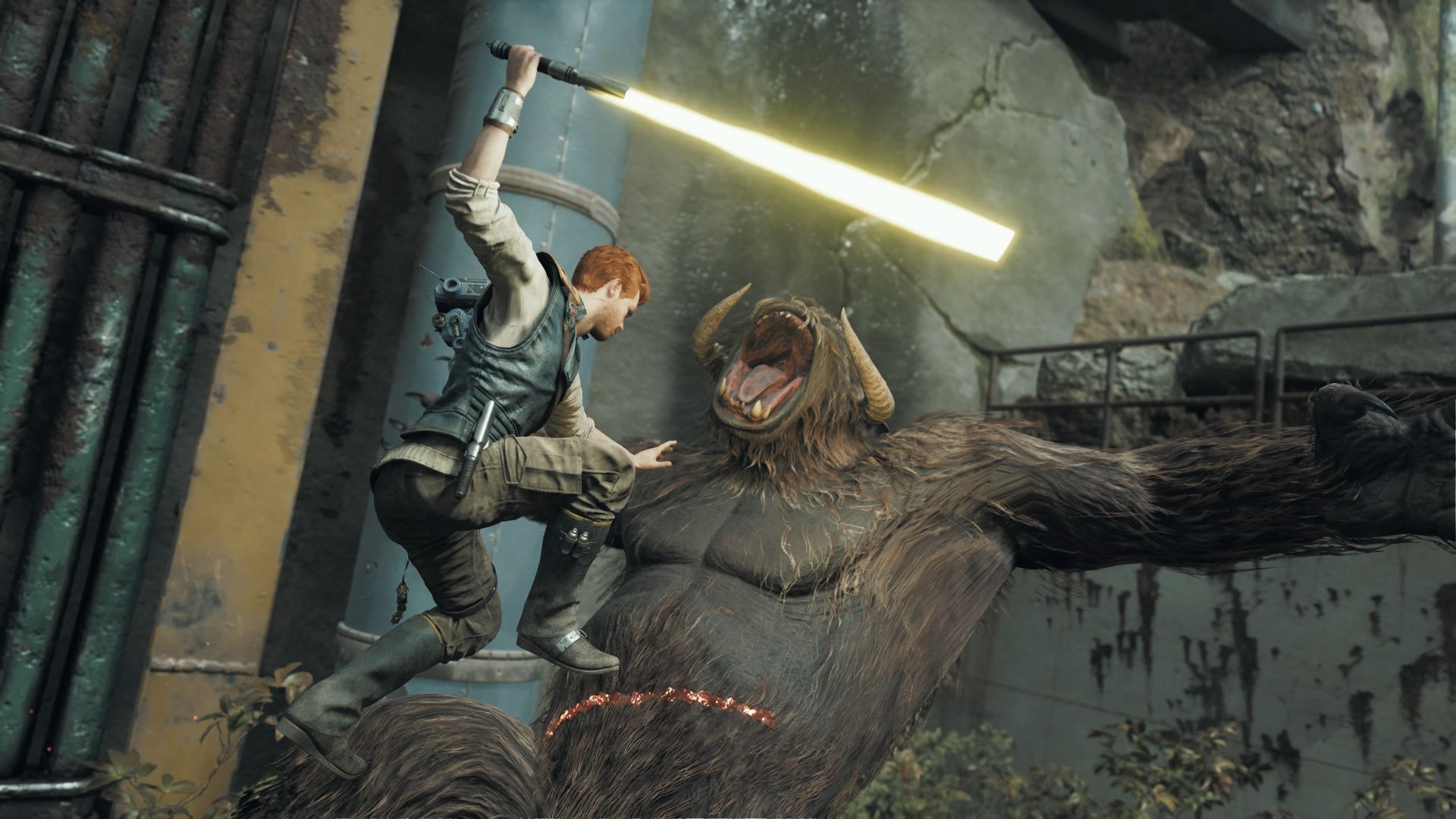
Star Wars Jedi: Survivor is bigger and more accomplished than its predecessor in almost every way that matters. More ambitious, confident, and heartfelt, it’s clear that this is Respawn Entertainment at full stretch, relishing in the scope and scale afforded by the success of Star Wars Jedi: Fallen Order. All that holds this bold sequel back, on occasion, is Jedi: Survivor’s tendency to over-reach in its attempt to tell the next Star Wars epic.
Picking up five years after the events of Jedi: Fallen Order, Cal Kestis is himself key to Star Wars Jedi: Survivor’s expansion. While most sequels offer something of a character reset, the story of Fallen Order makes that impossible for Cal – his growth through that game a crucial part of what his character has become in this one. The result is a Jedi more confident and agile than before, a fighter who feels like he’s reveling in his abilities from the very beginning. The Force Powers that Cal spent Jedi: Fallen Order recovering – double-jumps, wall-running, push and pull – are all there, ensuring versatility in combat from the outset. Combine that with a fighting style which flows between strikes more smoothly, and a camera that closes ever-so-slightly closer in on the action, and Cal feels like the hero of his story from its opening moments.
But it’s not just Cal that feels better from the start. The galaxy itself has been brought to life in a way more in line with the best Star Wars movies than anything Jedi: Fallen Order offers. An early scene feels like a shot directly out of the original trilogy. Set-pieces offer incredible vistas and heart-in-mouth action scenes. Planets feel like planets, rather than tiny regions. There are living worlds to explore, not just arenas of carefully-placed stormtroopers. Jedi: Survivor injects a huge amount of life into the Star Wars universe, and in doing so gives Respawn room to play. There’s humor and heart far beyond what I was expecting, and it’s only given the space to come to the surface because of the work that’s gone into making the galaxy feel like a living, breathing entity.
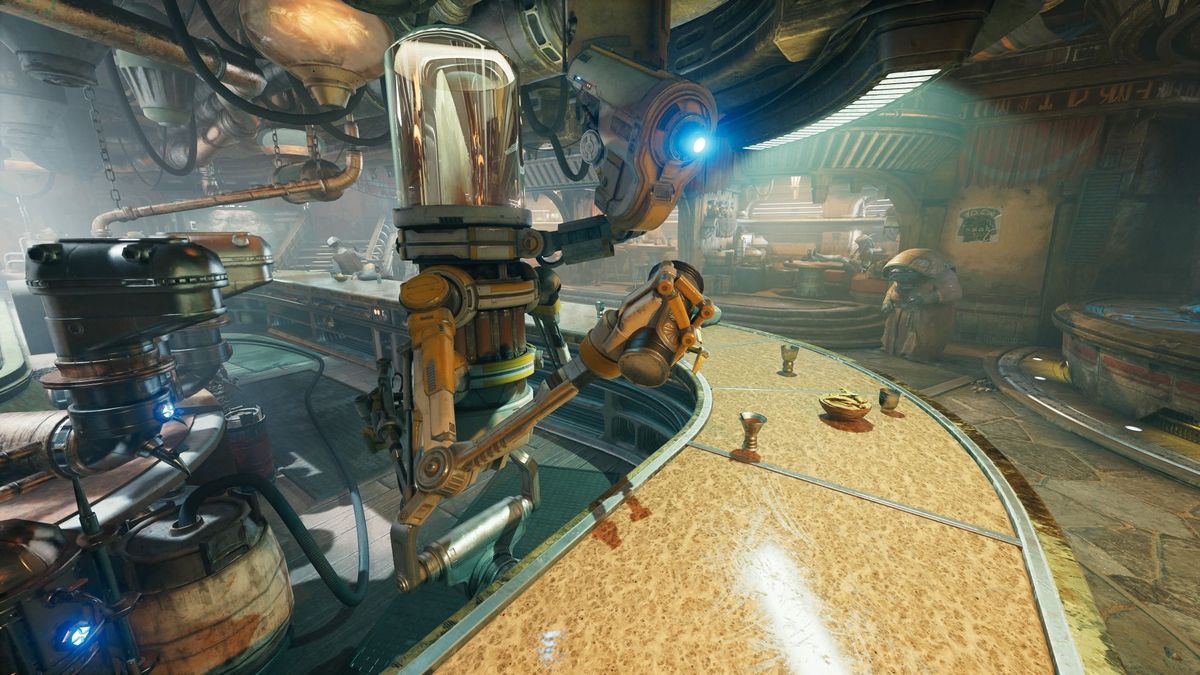
Much of that work is attached to Koboh, a planet that functions as a hub world for Cal to explore, as well as the location for a significant portion of Star Wars Jedi: Survivor’s story. Styled after the American Old West, it’s a classic frontier town; prospectors on every corner, a ranch owned by a woman literally called Mosey, an old-timey bartender droid in the saloon, and a bounty hunter-hunter obscured beneath the brim of a stetson.
Koboh is huge, a space that feels as though it dwarfs all of Jedi: Fallen Order combined and has the density to match its square footage; Jedi: Survivor’s Metroidvania-style traversal is at its most varied in the towering mesas and weaving canyons that spin off from the main hub area. Side-content, optional bosses, and puzzles fill every nook and cranny, and patrolling troopers ensure you’re not just battling random fauna as you explore. Fast-travel ensures that Koboh’s biggest expanses aren’t too disruptive, but it’s clear that Survivor’s maps haven’t been deliberately built to take advantage of the system.
All that size, however, remains the foundation of Jedi: Survivor’s keenest weakness. There are times when, in an attempt to fill this vast space, Respawn isn’t sure what to do beyond throwing challenges at you. Sometimes, these are elaborate jumping puzzles, other times arenas full to bursting with enemies. Through the first act in particular, there were times where I was desperately searching for a place to stop, more so that I could take a break than so Cal could replenish his health.
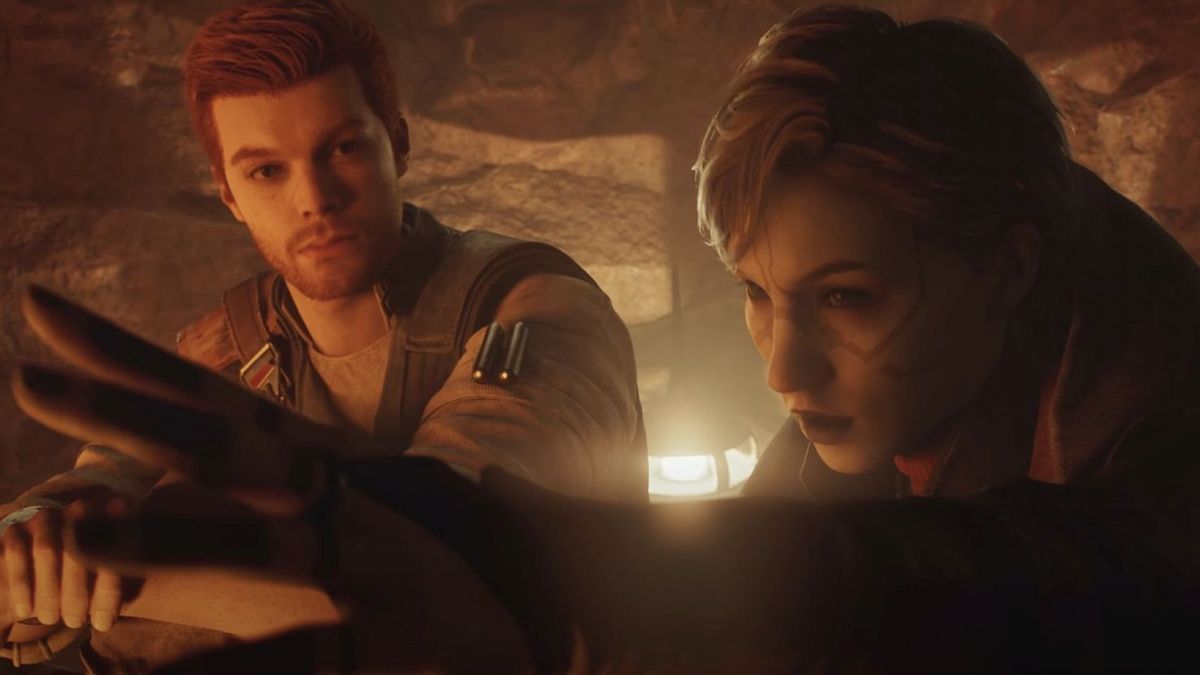
In an attempt to match the scope of its story to the size of its world, Star Wars Jedi: Survivor stumbles. What I thought was set to be a climactic moment after a beautiful set-piece ended up being only the end of the game’s first act. The story streamlines as you progress beyond this point, but having spent a dozen or more hours building up a major threat, Jedi: Survivor finds it difficult to climb back down. Later stages are suitable fodder for the broader stakes of the story, but it’s clear that Jedi: Survivor is trying hard to land on a true antagonist.
The main cast, however, is more than capable of supporting Jedi: Survivor through its less certain steps. As the Empire closes its fist around the galaxy, there’s a fascinating dichotomy at play between those desperately trying to find a place to hide from the regime’s greatest cruelties and those still trying to fight against it. Jedi: Survivor explores the time before the Rebel Alliance is established – a period where hope has given way to anger, fear, and resentment.
As Cal and Jedi Master Cere harden in the face of the injustices they fight against, other characters soften as they search for a safe haven in which to wait out the storm. The performance by Merrin actor Tina Ivlev is a particular highlight in a story that constantly plays to the strengths of its ensemble cast. Belly laughs are woven in alongside tragedy, but the mundanity of daily life is a potent refrain. As this universe moves away from The Skywalker saga, Jedi: Survivor sets itself up as a benchmark for what new Star Wars stories can look like.
Jedi: Survivor so clearly wants to live up to that mantle. There’s a sense of Cal as a folk hero, and of this story as a chance to show off what the galaxy looks like for those that aren’t its destined heroes. The focus is on the people simply trying to scratch out a living in the face of constant oppression, whether they once wielded a lightsaber or not. It doesn’t always work out – Koboh’s many side-quests don’t aren’t really necessary to prove Cal’s desire to help people – but there’s a maturity here that embraces Star Wars’ space-western roots while making clear that there’s a very big galaxy to explore out there.
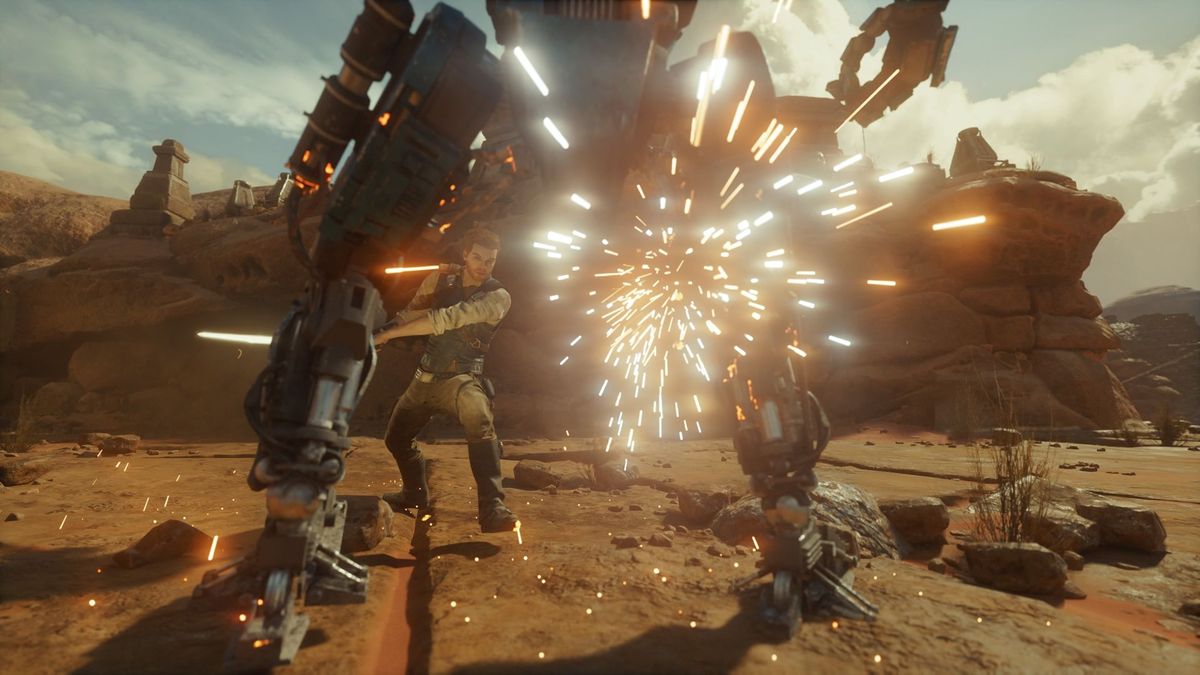
As strong as the world and characters around him are, it’s still Cal who’s forced to knit the whole thing together, and he really shines as he does so. With a suite of Force powers immediately available, Star Wars Jedi: Survivor gives you the space to play. The sandbox-style moments that once marked little more than the chance to try out a new skill in Jedi: Fallen Order now feel like a regular occurrence; arenas filled with droids or troopers are scattered liberally, offering the chance to really get to grips with the many new abilities you’ve got. Jedi mind tricks let you turn enemies into allies, Force Pull lets you turn a trooper’s weapon on his friends, whole groups of foes can be flung around like ragdolls.
But the real star is Cal’s new and improved saber. From the single and dual-blade setup he starts with, Cal gains three new stances; twin blades are fast and frantic, harrying foes under a persistent rain of blows until their guard breaks; the blaster stance lets Cal engage from range, recouping ammo with probing, testing strikes; and the crossguard turns saber into Zweihander, a slow but devastating weapon to smash through even the most hardy defenses.
As I started to get to grips with multiple stances, combat really opened up. The balance system, defined by Cal’s parrying skills, continues to make Jedi: Survivor’s fights feel like delicate duels, without robbing you of the chance to let loose around weaker enemies. Combined with those improved Force abilities, combat started to feel like a sandbox of control, dancing back and forth between cowering groups of enemies, sending a batch of stormtroopers flying off a ledge while ducking around a security droid as a Flame Trooper turns on his allies. Occasionally, Jedi: Survivor’s ambition would catch up to it again, cramming multiple complex enemies into the same space Fallen Order might have put a single miniboss, but despite some slightly cheap tactics, especially around battle droids, the difficulty balance felt perfect, especially in bigger spaces. At the end of one arena, out of stims and with just a sliver of health left, I felled a final enemy and breathed a genuine sigh of relief.
It took a while, but by the end of Jedi: Survivor the different stances really came into their own. Dual Blades felt crucial throughout, given the weight of enemies in some areas, and that means it’s a shame that only two stances can be active at any one time. To alternate between them Cal has to meditate, making it difficult to work out how best to use each one. An early boss succumbed to the constant pressure of the Twin Blades whittling down its weak defenses, but later on that same stance felt weightless in the face of the fury of stronger enemies. I turned to the Crossguard, a heavier weapon to let me weather the storm of those withering blows before retaliating in kind. Coupled with Perks, which let you further dial in on the strengths or weaknesses of particular stances, and there’s depth to Jedi: Survivor that definitely wasn’t present in the first game.
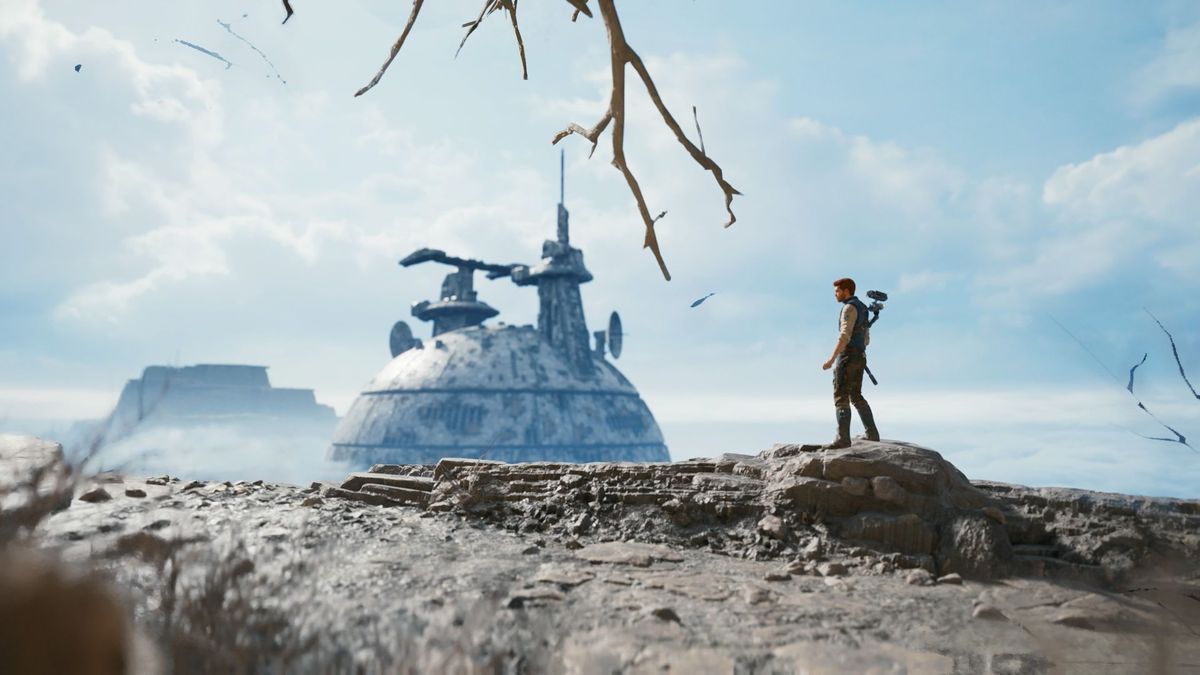
Even traversal is transformed – the confidence that’s evident in Cal’s combat feels like it lets him jump higher and wall run further right from the start, and mid-way through the game you’re slingshotting around, chaining together gravity-defying flights above aching drops like something out of a Spider-Man movie. Jedi: Survivor puts something of a limit on your leaps with a form of fall damage, but there’s a sense of mastery around movement that’s quietly one of its most exciting additions.
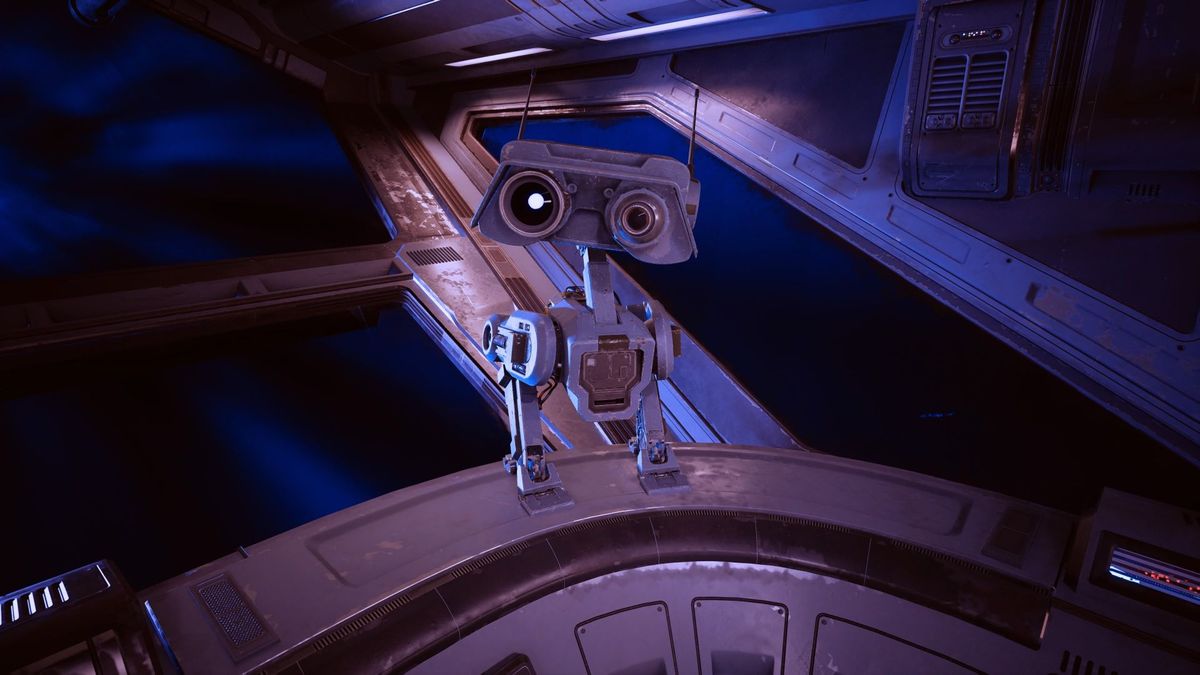
All of Cal’s new powers are additive – nothing is lost from Jedi: Fallen Order, and what you gain feels like a seamless extension of character and universe. It’s obvious that there’d be plenty of connective tissue between games, but Respawn uses Cal’s first adventure as an excellent foundation for his second; the re-use of Imperial enemies and animations helps stitch these stories together so closely that there were moments that the entire experience was so cohesive I could’ve believed it was DLC.
It’s the confidence to unabashedly lean on what’s come before that lets Star Wars Jedi: Survivor become its own excellent version of something new. Respawn pushes slowly at the edges of Fallen Order to expand its take on this world, doing so with an obvious love and respect not only for its source material, but its characters. Where it over-reaches, it does so out of an ambition so apparent that it leaps off the screen, but always manages to ground itself in a beautifully human story. In allowing Cal Kestis’ story to grow with him, Jedi: Survivor establishes what could be the next great Star Wars hero, and is certainly one of the best Star Wars games out there.
Star Wars Jedi: Survivor was reviewed on PS5, with a code provided by the publisher.